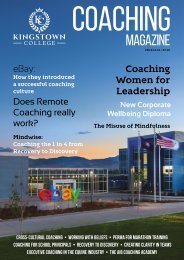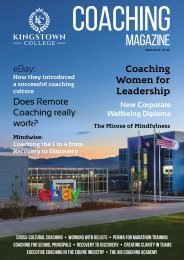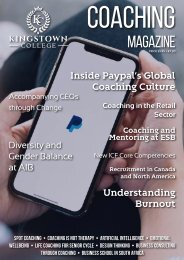Kingstown College Coaching Magazine vol.5 2019/2020
Welcome to another information filled publication of our Coaching Magazine!
Welcome to another information filled publication of our Coaching Magazine!
- No tags were found...
You also want an ePaper? Increase the reach of your titles
YUMPU automatically turns print PDFs into web optimized ePapers that Google loves.
60 Coaching Magazine Vol.5
just right. Research by Neuroscientist
Amy Arnsten shows peak performance
is achieved when out brains have just
the right amount of two chemicals
Noradrenaline (the chemical for
alertness) and Dopamine (the chemical
of interest). If the balance is not right
we are bored or overwhelmed.
Coaching with the brain in mind means
working with the limitations of the
PFC in mind. It often involves getting
people to move away from autopilot
and old habits and into more conscious
thought. It takes significant effort and
energy from the coachee as the brains
preference is to use the option already
hardwired.
It’s hard to deconstruct old wiring, it’s
easy to create new wiring
We try to change our old wiring all
the time. Trying to get rid of habits
no longer serving us by focusing on
the issue is often ineffective. We can
end up deepening the connection we
are trying to break and creating more
awareness of problems. Focusing on
solutions is a better strategy. It creates
energy in our minds and helps the brain
stay in a positive state so we get more
creative and open up more to ideas.
Keeping Hebbs Law (1949) in mind,
Neurons that fire together, wire
together. Three keys to helping habits
and new wiring to stick are
1. Pay the new habit a lot of attention.
If we want to create a new, long
lasting connection in our brain,
we need to pay it a lot of attention
in the form of the quality and
quantity of focus. Getting people
to put energy in, by having them
think about it, write about it, speak
about it all make links to different
parts of the brain and help create
new maps with more density and
more firmly.
2. Repetition. Repeating the behaviour
every time situation X arises, helps
the brain build new hardwiring.
Implementation intentions are a
great way to help us remember
to repeat something – If I am in
circumstance x, then I should do y, in
order to achieve Goal Z.
3. Positive feedback is a signal to the
brain to do more of something.
It reinforces the new wiring the
coachee is trying to make so it
becomes a hardwired habit. When
you give positive feedback when
you notice the coachee focusing
on solutions, the brain sees this
as a reward which helps to further
embed the new habit
Good news! Experience consistently
and continuously changes the brain.
In the fairy story, Goldilocks was the
villain trespassing into the homes of
the three bears. In the original, she
gets eaten as a result. There are no bad
endings here.
Healthy brains retain the ability to
change and adapt and grow new
connections over our entire life (called
Neuroplasticity). Our role as coaches is
to get curious and design experiences
that take full advantage of this capacity
for change. I hope this article has
helped.
References
Arnsten, Amy. NeuroBiology pf Executive
Function. Catecholamine Influneces on
Prefrontal Cortical Functions. Biological
Psychiatry. 2004 Oct. (published online)
Rock, David. Quiet leadership. (New York;
Harper Collins, 2006) Brain based - coaching
principles identified in this article originate
from the NeuroLeadership Institute.
Taylor, Katherine and Marienau, Catherine.
Facilitating learning with the adult brain
in mind: A conceptual and Practical Guide
(Wiley; 2016)
Rachael Clarke Ph.D.
Rachael Clarke, PH.D. is a executive coach and facilitator. A neuroscientist with 12 years healthcare leadership experience with AstraZeneca
at a local, regional and global level in the fields of Compliance, Sustainability and Learning and Development. Rachael is passionate about
empowering daring, authentic and sustainable leadership by helping leaders become the best they can be.
Rachael holds an first class honors degree in Human Physiology, a postgraduate diploma in Statistics and a Ph.D. In Neuroscience. Her advanced
diploma in Professional, Leadership and Executive Coaching is from Kingstown College and she is certified in Intelligent Leadership and Brain
-based coaching methodologies. Rachael is a member of the Kingstown College Faculty and works with the NeuroLeadership Institute.






